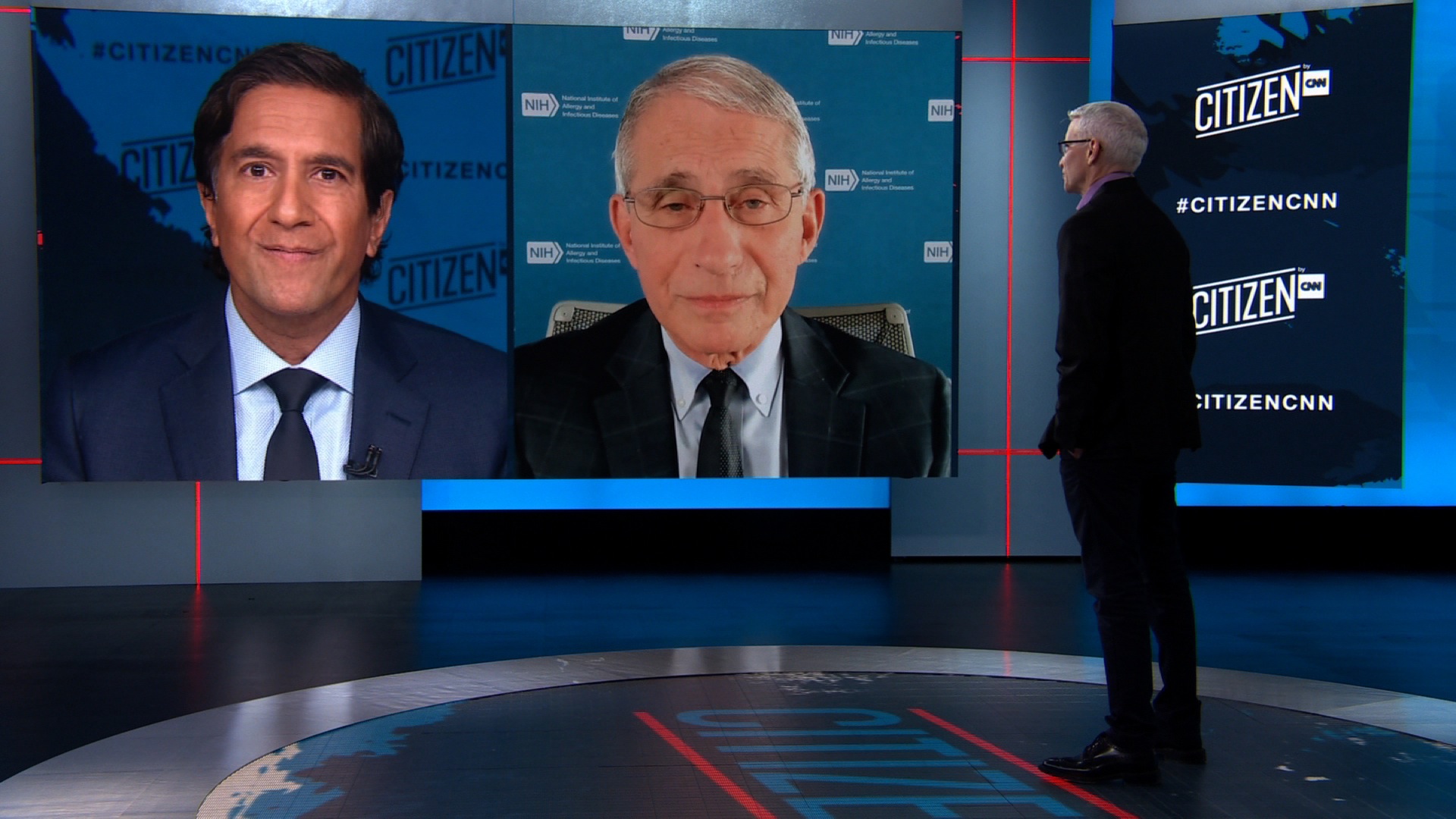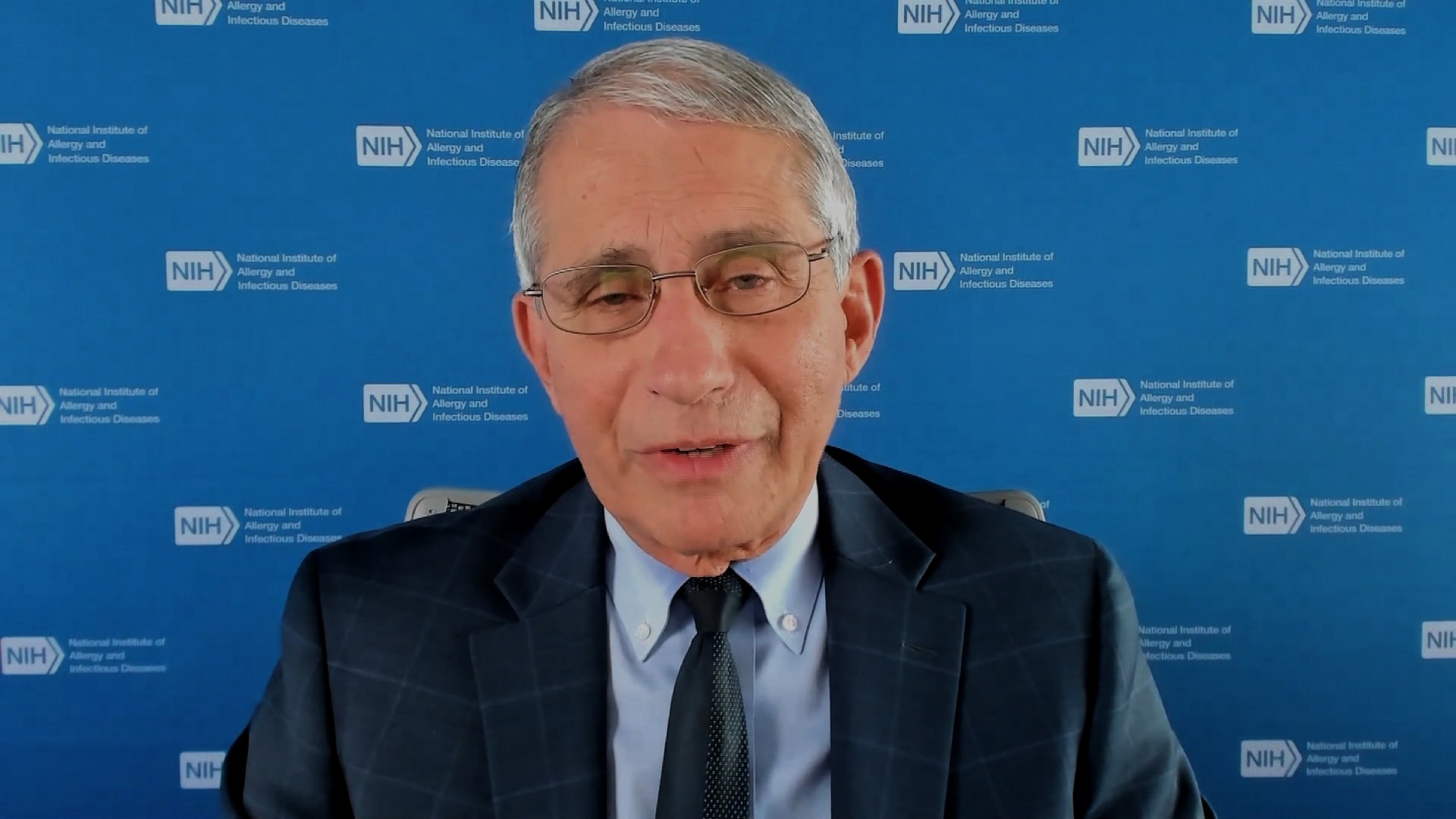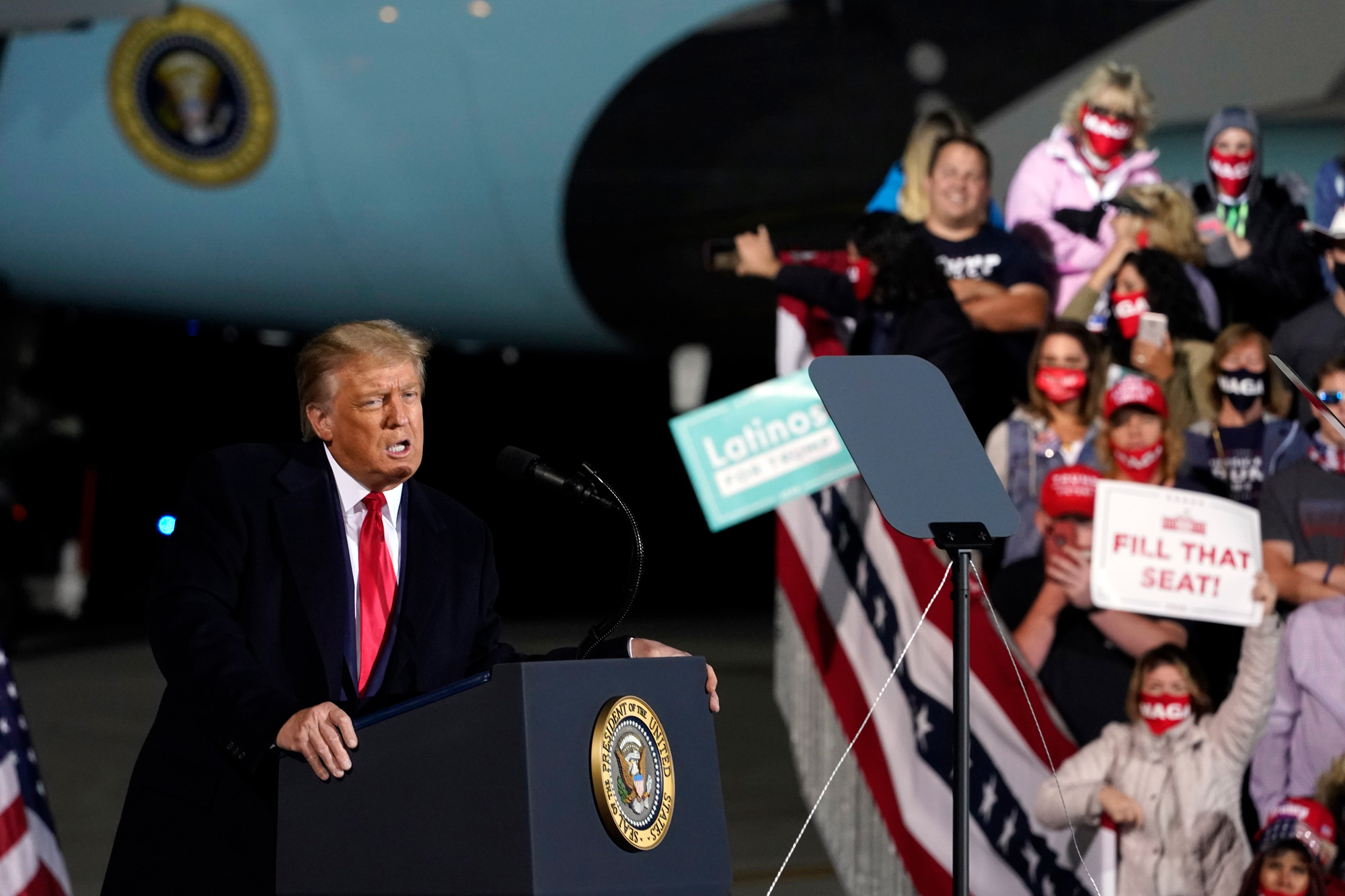Fauci says aerosol transmission of Covid-19 "doesn’t change anything we've been saying"
From CNN Health’s Naomi Thomas
Dr. Anthony Fauci, director of the National Institute of Allergy and Infectious Diseases, told CNN’s Dr. Sanjay Gupta during the CITIZEN by CNN event on Tuesday that you can assume aerosols are a component of Covid-19 transmission. And while the amount they contribute to the spread it isn’t yet known, it doesn’t change what has been said.
“You can make a reasonable assumption, Sanjay, that some aspect of transmission can be and is by aerosol,” he said.
“The interesting thing about that – it doesn’t change anything that we’ve been saying. It means wear your mask. It means avoid close contact. It means avoid crowds. And it means what we’ve been saying, the third or fourth thing that I mentioned to you just a little while ago, is that outdoors is better than indoors,” he said – because if there is aerosol indoors, there can be some recirculation.
Fauci said there have been some case reports of situations in places such as restaurants, “where it looks like it almost had to be an aerosol spread.”
Remember: The US Centers for Disease Control and Prevention abruptly reverted to its previous guidance about how coronavirus is transmitted, after saying on Friday that the virus can spread through the air.
Vaccines timeline projections are just that – projections, Fauci says
From CNN Health’s Amanda Watts
 Dr. Anthony Fauci, center, speaks to Dr. Sanjay Gupta, left, and Anderson Cooper during the CITIZEN by CNN Conference on September 22. CNN
Dr. Anthony Fauci, center, speaks to Dr. Sanjay Gupta, left, and Anderson Cooper during the CITIZEN by CNN Conference on September 22. CNNDr. Anthony Fauci said “vaccines are being produced to be ready to administer – if we get a good signal that it works.” But projecting when that might be is just that: a projection.
Speaking to CNN’s Dr. Sanjay Gupta during the CITIZEN by CNN Conference on Tuesday, Fauci said, “People can have projections of what they think might happen.” But no one really knows when a vaccine will be ready, he said.
“But today, Sanjay, nobody knows what those data are because no one has looked at them. They are blinded,” he said.
Despite this, Fauci remains “cautiously optimistic” – after reading preliminary studies – that we will have a positive effect when it comes to a vaccine.
Fauci on Trump grading his Covid-19 response with an A+: “Take a look at the numbers and make up your own mind”
From CNN Health’s Amanda Watts
Dr. Anthony Fauci said he wouldn’t grade how the United States has handled the Covid-19 pandemic – but instead said the numbers speak for themselves.
During a CITIZEN by CNN Conference on Tuesday, Dr. Sanjay Gupta read a viewer question about President Trump giving the White House response to the pandemic an A+.
Fauci refused to give his own grade, saying he doesn’t find those types of questions helpful.
“Take a look at the numbers and make up your own mind,” Fauci said. “We don't need a soundbite from me. Take a look at the numbers.”
Some context: "We're rounding the corner," Trump told "Fox & Friends" of the coronavirus during an interview Monday morning. "With or without a vaccine. They hate when I say that but that's the way it is. ... We've done a phenomenal job. Not just a good job, a phenomenal job. Other than public relations, but that's because I have fake news. On public relations, I give myself a D. On the job itself, we take an A+."
The President's comments come as the country nears 200,000 coronavirus deaths.
Watch:
Fauci says lowering the US Covid-19 baseline is “not rocket science"
From CNN’s Health Amanda Watts
“We've got to keep that slope coming down,” Dr. Anthony Fauci, the nation's leading infectious disease expert, told CNN’s Dr. Sanjay Gupta on Tuesday.
When it comes to Covid-19 cases in the US, the baseline is just too high as we head into the fall and winter, Fauci said during the CITIZEN by CNN Conference – and we’ve got to start working on that now.
To lower the levels, “You do that by looking at where you are, in what region of the country, and acting accordingly, according to the guidelines,” Fauci said. “That's not rocket science.”
“When you have weak links in the chain, and some components of society are not doing it, it just makes it very difficult for the rest,” Fauci said.
Watch:
Fauci says officials aren't changing their minds on guidance — the science is evolving
From CNN Health’s Amanda Watts
Dr. Anthony Fauci said Covid-19 is an “evolving outbreak” and it needs to be lead by using scientific data.
Speaking to Dr. Sanjay Gupta during a CITIZEN by CNN conference on Tuesday, Fauci said, “The public needs to understand is that this is an evolving situation.”
Fauci said “a classic example” of this is back in the spring, when officials altered mask guidance.
“We were not aware that 40% to 45% of people were asymptomatic, nor were we aware that a substantial proportion of people who get infected get infected from people who are without symptoms. That makes it overwhelmingly important for everyone to wear a mask," Fauci said.
“Masks works. Physical distancing works. Avoiding crowds work,” Fauci said.
Watch:
Fauci calls the impending 200,000 Covid-19 death toll "sobering" and "stunning"
From CNN Health’s Amanda Watts
 Dr. Anthony Fauci speaks during the CITIZEN by CNN event on September 22. CNN
Dr. Anthony Fauci speaks during the CITIZEN by CNN event on September 22. CNNDr. Anthony Fauci said the impending 200,000 death toll from Covid-19 in the US is “sobering” and “stunning.”
Speaking to CNN’s Dr. Sanjay Gupta during the CITIZEN by CNN event, Fauci said the nation’s current baseline of 35,000 to 40,000 cases a day is too high.
This high baseline, “ultimately – some will lead to hospitalizations, and those will lead to death,” he said. “The idea of 200,000 deaths is really very sobering and in some respects, stunning.”
Watch:
Trump falsely claims coronavirus affects "nobody young" as death toll climbs
 President Donald Trump speaks during a campaign rally at Eugene F. Kranz Toledo Express Airport on September 21 in Swanton, Ohio. Alex Brandon/AP
President Donald Trump speaks during a campaign rally at Eugene F. Kranz Toledo Express Airport on September 21 in Swanton, Ohio. Alex Brandon/APAs the US approaches the grim milestone of 200,000 death from coronavirus, President Trump last night falsely claimed the virus affects "nobody young."
"We now know the disease; we didn't know it. Now we know it -- it affects elderly people with heart problems and other problems. If they have other problems, that's what it really affects. In some states, it affects thousands of people, nobody young. Below the age of 18, like, nobody," Trump said at a rally in Swanton, Ohio.
"They have a strong immune system, who knows. Take your hat off to the young because they have a hell of an immune system," he added. "But it affects virtually nobody. It's an amazing thing."
Previously, Trump claimed children children are "almost immune from this disease."
Facts First: While children are, on the whole, less likely to get seriously ill or die from the coronavirus than adults are, they are certainly not "immune;" children get infected, transmit the virus, and do sometimes get seriously ill or die.
Watch health experts react to Trump's rally comments:
Doctors remember colleague who died from coronavirus after working to fight the virus for months
From CNN's Adrienne Vogt
Dr. Rebecca Shadowen, a Kentucky infectious disease specialist, recently died of coronavirus after fighting the virus for four months.
She worked for three months straight, became sick in May and died about two weeks ago.
Two colleagues and friends who treated her, Dr. Karan Singh and Dr. Nisar Kazimuddin, reflected on her influence and work on CNN's "New Day."
Singh said Shadowen used to text him at night while she was researching treatments for other patients.
“The impact she's had on the hospital here and the practice of medicine here is…tremendous,” Singh said.
In July, while still in the hospital, she posted on Facebook telling people that she was encouraged by progress to fight the virus and telling everyone to keeping wearing masks.
“Being in the ICU and, you know, being on the ventilator so many times and everything that comes with it, extracts its toll on people. Sometimes despite everything that we can do and, you know, she got everything, you know, it falls short,” Singh said.
Watch more:
CDC panel will delay a vote on who should get a coronavirus vaccine first
From CNN’s Elizabeth Cohen
A US Centers for Disease Control and Prevention committee is expected to delay a vote about how to prioritize who will receive a coronavirus vaccine first, according to a committee member.
The CDC’s Advisory Committee on Immunization Practices had been expected to vote Tuesday on a plan to guide states in deciding who should first receive limited supplies of a vaccine once one is approved.
However, that vote was delayed while the committee’s working group studies the issue further, according to Dr. William Schaffner, an infectious disease specialist at Vanderbilt University Medical Center and a member of the committee.
“The working group has not fully worked out its plan to present to ACIP today, so the CDC has decided not to ask ACIP to vote today,” Schaffner said.
Schaffner, a member of ACIP’s Covid-19 vaccines working group, said there’s general agreement among the group that frontline health care workers should be the first to receive the vaccine. He said it’s unclear whether the next group should be people who are at high-risk for Covid-19 complications, such as the elderly and those with underlying conditions, or if it should be essential workers.
Schaffner said he did not know when the working group will come up with a plan for who should get the vaccine first.
“I’m sure the states would be assisted in their planning if they could rather quickly be given a prioritization scheme,” he said.
The news of the delay was first reported by The Wall Street Journal.

 5 years ago
837
5 years ago
837 

